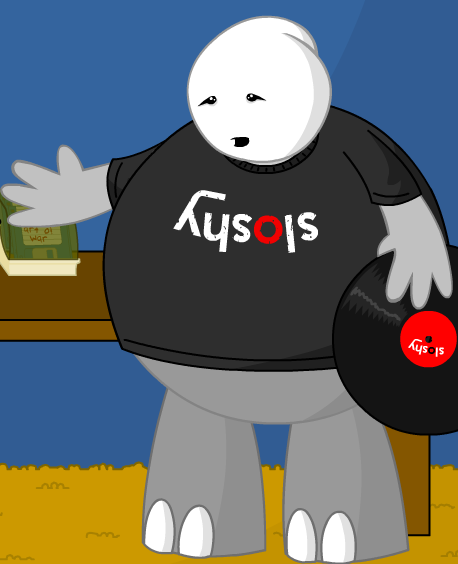- cross-posted to:
- [email protected]
- cross-posted to:
- [email protected]
“Please call me.”
“No.”

“Please call me”
Translation: I want to tear you a new one through a non-written medium so it doesn’t get recorded.
“No”
Translation: You have no power here.
I have an app that records all my calls. All of them. It’s uploaded to the cloud daily.
I did it because I know I’m not the only one listening to them. Or at the bare minimum parsing them. If csis or the NSA isn’t running all our calls through some kind of aj I’d be shocked. “Oh w|re not recording your calls don’t worry” they’d say slyly as every fucking utterance is tokenized and stored forever in some kind of creepy fuck you mainframe somewhere.
When I started looking through what Google collects on me I realized that this is just what they’re letting me see and there’s all kinds stuff I don’t get to see. And they "keep it for 3 months’ or some timeframe like that (riiiight).
If the time ever came where I needed any of that data (I’m extricating myself from Google slowly but surely but in the meantime) - they’ve proven they’re not trustworthy enough for me to be able to rely on them to get it.
Also I can do fuck you.
deleted by creator
“I was just informed you weren’t on the morning stand up call this morning” implies that this person wasn’t there either.
I’m guessing this was a manager who usually isn’t (and shouldn’t, at least in Agile) be on standups.
The meek “please call me” was after the manager found out from upper management that they were far more replaceable then Caleb was.
Exactly. If Caleb had it in writing that he was going to be paid regardless then the dude had some serious leverage.
Nah, “call me” always means “let’s make this a real-time social hierarchy game, because I’m good at exploiting verbal cues and expectations to shove people toward my desired goal.”
And also a way to move something to where there’s no proof of what was said.
The #1 reason in my experience. The only bosses who have ever said this to me are ones who were manipulative creeps where i made sure to keep a record (outside the company tools) of everything they ever said. It was never said to me like this, it was just standard operating procedure for that type.
No, “call me” means “I’m going to say some things to you I don’t want to put in writing that could be used against me later.”
There’s also the “oh shit, I’ll get this fixed, but nothing I say can be in writing or I’m definitely getting fired” possibility.
Nah boss, I just apologized for my misunderstanding, I have no idea why $Insubordinate_Contractor is saying that I said he’d better come in or I’m going to blacklist him in the entire industry and ensure he never works again … I mean, why would I say that?! I don’t have that kind of power!
Yup those of us who are not good at bad faith conversations need to get good at recognizing when one is about to happen and insist on written.
“We need to take this conversation offline” is a near-universal precursor to ethical dispensation.
If you want an example, every online “debate” is a bad faith convo.
Oh so you’re calling me a liar??!
You sound defensive!
Or it’s the manager seething with rage, wanting to vent that rage, but not being able to do it adequately via text message.
I really wish these were true.
Why do so many of you Redditors think everything is fake? Like, really, where’s the evidence or even “tall tale” tone that makes this sound fake to you? Just because it’s not common? Do you only accept things that are rarer if you see them in photos or something?
Redditor that believes evening they read complains about “redditors” calling everything fake.
You certainly couldn’t fake this level of irony.
Where I am a contractor we have successfully petitioned to delay a “morning standups” until 1:30 p.m. - Which is a much better time to have it because it gives everyone time to A actually wake up, and be there, and B let’s me actually read emails.
So many times things don’t get covered in the morning stand up because no one’s read their emails yet, and then you have to have another meeting at about 11:00 in order to discuss the contents of the email.
Unless the email pertains to the whole team and will take less than 5 minutes to discuss, keep it out of standup!
I worked with a woman when I worked for the federal government who was quite unpleasant. She left and went to work for a major contractor. I was on a call with her when several of her people didn’t show up for the call. She was raging and asked me where they were. I told her that I had no idea where her people were. She finally had had enough and demanded that I go find them and get them on the call. I said, “I’m not going to find YOUR people on your call with me, THE CLIENT. I don’t work for you anymore, Diane.” and hung up on her
In my experience, daily standup meetings are largely pointless. It is yet another meeting that should have been an email or slack thread.
Unfortunately there are many juniors that you give the job of doing A to C, and if you come back a week later they’ll report they’re still stuck at job A, point 1 and didn’t want to message anyone, and is something a senior can fix in 5 minutes. Even worse you message them and they just report everything is ok, they’re working on it. Of course they never update the status of the project so you never know if they’re stuck or just not updating.
That makes daily meetings necessary so they don’t lose the entire week and delay the project. Unfortunately more senior members also get dragged in those meetings. It’s a frustrating part of working with mixed teams and a “just let me code” mentality.
While I agree that a daily standup would help with this, I feel like there’s other avenues to approach this problem. If their task is to do A -> C, give them some deadlines and if they don’t meet them then become more involved. Have them check in with a senior on the problem. No need to drag the entire team into a standup because the juniors can’t figure it out. You can also try to build a culture of asking for help, which is difficult to do. People either think they can figure it out eventually, or they’re just slacking.
There’s also the very usual problem of the scope of the tasks not being well defined and many times too big, so juniors get overwhelmed and it’s difficult for them to focus on small things to actually progress or identify that they are blocked.
I remember well that when I was junior and not having yet a proper notion of when to call it “I’m blocked” since many times it seems one is blocked but is not, like spending 1 or 2 days reading and understanding the code and how all things work are very legitimate things, which are needed to even know what to ask about. But other times I was actually blocked but could not understand that I was because it felt I was just trying to understand the code and was actually going in circles not knowing when to stop.
It’s all a balance, but the one important thing to do is communicate about it, not just a “I’m doing it”. Usually pairing with someone and take some time to explain the “thought process” and the “current understanding” helps a lot. But, a junior kinda stuck will many times not ask for that time. What I usually do is just after a daily be the one to approach the junior and ask him to pair for a while to help him, without him even asking. Many times this solves the problem.
It makes sense if you’re in an industry with hotspot flare-ups. I work MSP IT and those morning meeting are the way my team asks for help on pressing issues, or rings the alarm bells on business impacting outages. Additionally, Tier I helpdesk and Tier III projects never communicate, so the SUM is where T1 hears about where projects are at (in case they get the breakfix for that item) and T3 knows how swamped T1 is and what mobile techs are out, and T2 gets a chance to tell us if the flow from T1 and T3 into the “escalation sandwich” is too much. And we genuinely have it down pat to 5-10min.
Don’t get me wrong, I’ve had shitty SUM requirements, but when they’re done right, it’s better than a state of the union email/Teams message.
Still could just be a slack thread or a dashboard. Putting people in a room every day is simply wasteful, even if it “works okay”. When I managed a team I hated them, but we did have a meeting each Friday afternoon to go over what we did well that week, so I guess you have to be tactical about when you pull everyone off task to huddle.
It really depends on the group, the workload, and the structure. I’ve got two fairly ADHD employees that love rabbit holes and one that’s great at focusing, but regularly needs some guidance. A daily morning touchpoint meeting like a standup does wonders for getting us all on the same page, making a few quick decisions, and unblocking them all. It’s honestly the best 15-20 min we could spend for productivity and engagement and our most productive meeting of the day.
We also just do it at our desk or virtually on WFH days because it’s a waste of time to walk 5 min to a room and back when we can use that time solving problems.
If we had less ticket churn, or less interruptions from on call/support work, we could probably do it just MWF, but that’s just not in the cards.
We also just do it at our desk or virtually on WFH days
So, it’s not actually a stand-up meeting.
We do in fact, stand up for it.
People working at home have to stand up? So, their cameras are pointed at their bellies?
Stand up desks are a thing!
It makes sense if you’re in an industry with hotspot flare-ups
Only if handled properly, which a lot of supposed “stand-ups” aren’t.
I don’t see how you can have a meeting with members of 3 different tiers of support where progress on multiple projects is summarized in a way that someone not on the projects can get anything meaningful out of it, in addition to tier 1 gets to talk about how swamped they are, and tier 2 gets to talk about the flow from tier 1 into some delicious sandwich, and have that only take 5 minutes. I’m guessing that’s a minimum of 15 people in the meeting, if you have multiple tiers and everyone’s present. To get things done in 5 minutes means that on average everyone only gets to talk for 24 seconds. If you have people who aren’t talking, that suggests they don’t need to be in the meeting.
In addition, the whole concept of “standing up” for a meeting is stupid. Sure, it means meetings don’t last as long, but that’s because it’s uncomfortable. Plus there are social dynamics issues you introduce between tall people (often men) and short people (often women).
There may be some scenarios where they are helpful, but I think it’s possible to do it asynchronous in those situations.
If there’s a critical issue that needs to be dealt with ASAP, there should be an escalation process.
You can have reoccurring (or ad hoc) meetings to discuss projects across teams. If the standup is a slack thread, any interested party could view it (based on channel permissions).
It shouldn’t be on the individual members to bring up poor processes or that they’re overworked in stand-ups. That should flow through their managers
Not trying to be difficult with my responses, just adding my insight from years in tech across a few different positions and companies. I am happy to hear that your team has a process that works!
Generally true. We have a daily 30m “standup” but mostly it’s just us shooting the shot because we’re all remote, and it’s a way to socialize a bit. It’s pretty much optional but most of us usually show up just to chat a bit.
We do our real meeting on Monday mornings
Meeting per videochat with the whole team 1 or 2 times a week is enough.
So glad I don’t work in IT, all I hear about are endless ‘standup’ ‘agile’ ‘blah blah blah’ meetings.
I work remote and message my manager if I need anything. We talk over Teams almost every day, why would we need a meeting. I work with providing support to a client for their Customs import activity. Just leave me alone and let me do my work!
I think that there’s too many tech jobs which are middle management whose job is to make it look like they’re doing something while contributing nothing.
Just leave me alone and let me do my work!
Agreed! If you need me you know how to reach me.
There’s a point. Usually it’s to stroke the ego of the managers and reinforce that they can make you do anything, regardless of how useless that activity is.
They can also spend the time interrogating everyone at the same time about how their output isn’t good enough and that they should try harder despite having most of their working time being sucked up with unproductive meetings and fucking TPS reports, and filling out time and completion information on their tracking system, all while you’re getting random ad-hoc untracked walk-up requests from anyone passing by.
I swear, I spend more time reporting and accounting for the fact that yes, I’m working, like I’m paid to do, and I’m expected to do, than I actually spend on doing the work I’ve been hired for. Now we have mandatory meetings about whether I’m doing work and why I’m so far behind and/or so slow at getting things done… maybe I’d be able to get my work finished faster if I didn’t have to stop every 10 minutes to report that, yes, I’m actually still working on the tasks I’m assigned, and dealing with Mark for the sixth time today because he walks by my desk and always has some inane complaint/request/question that he just needs to relay to me every time he goes to the bathroom. I’m not your therapist Mark, if you need me to do something, submit it through the tracking system so I don’t keep looking like a lazy-assed failure! But no, mark is the step nephew of some c-level and if I actually complain or deny him, he’s going to run off to my superior and then I’m going to have more meetings and shit on my plate. I just want to do my job. Leave me the fuck alone.
If your boss is checking in on you that much, that isn’t a good sign.
At minimum, I would let your boss know before you do anything for the nephew because it is their job to say your priorities. Hell, you can even blame your boss for doing this. “I’m sorry, but my boss won’t let me do that” is a great excuse which puts the responsibility on someone else.
Yup, this. My last job was nothing but meetings where everyone in the room knew what you were doing but everyone still went around the room to verbally reiterate what they were doing… that day! My brain was melting, it felt like grade 3!
You need as many meetings as you need as many meetings. If you need one, set one up. Don’t set them up just to fill them.
The worst part is they ate into all the work time. So leads were like why isn’t this done, well because you had me in a 3h meeting at end of day, that’s why. But that was apparently your problem, not theirs.
“You really need an attitude adjustment”… 😂
John Cena has entered the chat
I love this person so much. Good god I would pay hundreds of dollars for an intensely realistic VR game where I can just go absolutely apeshit on middle managers for hours every day.
We do what I call a shotgun standup twice a week. But it is done async 99% of the time.
Every Tuesday and Thursday we have 30 minutes that conveniently coincides with opening of the coffee shop in the office (two of us are onsite, six remote) prior to which the team is intended to write three bullets in the meeting chat:
- Prio one yesterday - and outcome
- Prio one today
- Any blockers discovered for either of those
If nobody posts a blocker, then we get 30 minutes on the calendar where nobody from outside our team can schedule anything. And the onsite folks get the freshest coffee before everyone else gets down there.
If there is a blocker; the person who called it out and the most experienced person in dealing with that type of blocker will join the call, as will anyone interested in the outcome. Once the blocker is resolved, the solution is put into the same meeting chat.
I need my life to be like this.
That guy probably doesn’t have healthcare. Also, I think our boy here probably got fired anyway. If there’s one thing a tin pot dictator absolutely can never permit, it’s someone else escalating a situation without a response. If you have to have obedience at all times, that means you always have to be the one escalating.
You can use it against them, of course. People will escalate even to the point that it gets them fired, as long as they didn’t have to back down.
Am I the only one who thinks working with this guy must be insufferable?
Not to mention, in the US contractors are on the hook for all income taxes. The tax payment has to be planned for in advance, whether it’s saving for it or paying quarterly estimate payments.
Contracting works well for people with a valuable skill set, but many get screwed by it.
You also have to pay the 15% (of net) self employment tax that your employer normally pays when you’re a W-2. That effectively means you’re paying double the tax rate of a W-2 employee.
Oh and you can deduct your “business expenses” to try to reduce your tax burden, but you shouldn’t even try to itemize unless your yearly expenses are higher than the standard deduction ($13,850 for single / $27,700 for joint / $20,800 for HoH). Itemizing doesn’t add to your standard deduction, it replaces it.
Source: My wife is a contractor and taxes for us are a whole fucking ordeal. We’re just glad I have a W-2 job thar offers benefits and the option to pay a lot more than I need to in tax withholding.
Just in case you aren’t aware, an LLC has the option to be taxed as an S-Corp which can be beneficial tax-wise depending on her income level. There is more paperwork involved because she would have to run payroll for herself, but it can be worth it. Theoretically, your accountant would recommend this if it would be beneficial for you, so hopefully, this isn’t news to you guys, but if so, it may be worth exploring.
No, this is not news to us - our accountant has certainly mentioned it - but there’s a lot of oddities in her situation that make this a little more difficult - like the fact that she’s not an actual freelancer but it’s just the compensation startegy that this grant-funded project she works for was built around.
Its not impossible though, and certainly something we need to look more into. Thank you for bringing it up especially for anyone else looking at this in a similar situation.
Not always - there are “w2 contract” positions, usually going through a temp agency - which can be long term nonetheless.
You could be describing a politician.
Typical “manager”. Everyone show up to these useless meetings that don’t get work done or you can’t work here 🙃
deleted by creator
Ha ha ha ha.
However, I guess in that position I would still be more cautious with wording. No need to burn bridges to make a point.
Depending on the work and the contract, it may be the company burning a bridge. Specialized labour can be both difficult and expensive to find.
A lot of contractors (good ones) know how to play the game. You can get away with a lot when the companies vertically integrated sales app that only they can fix goes belly up. Saw this before where an easily replaceable manager goes up against a long time contractor (ya know, with a contract) and leadership gets to decide how to resolve the situation…
There was a story posted on Reddit about 2 years ago, long as fuck but worth the read, about why you don’t piss off specialized contractors.
It doesn’t have a happy ending, but not for reasons you’d think.
How is being a contractor relevant here? A normal employee could say exactly the same things
Yeah and a normal employee can actually be fired. But independent contractors are usually on completely different contracts so unless the contract actually says they have to start at 9:00 a.m. they don’t have to do anything. Refusing to start at 9:00 a.m. is not a breach of contract like it would be for an employee.
I’m a contractor because the company that I contracted for is far too cheap to actually pay full-time staff, I tend to get in around 10am ish (although one time I started at 4:00 am because for some reason I had loads of energy and couldn’t sleep but then I finished it like 11am so I still did short hours).
As long as a contractor does the work there isn’t really much else they can complain about unless the employer puts other stuff into the contract. It sounds like in this case they didn’t.
In the US requiring a schedule is one of the factors that’s considered when determining if a contactor should be an employee. Other factors include if you’re telling them how to do the job, or who provides the equipment. You can get in trouble if you’re hiring people as contractors that should be employees.
And get fired without pay. Contractors have some problems of their own, but their contract usually guarantees a certain amount of pay and if they’re any kind of smart, specific job duties.
I mean, only if you live a country that hates people and refuses to pass any laws about worker protection. If a dutch employer wants to fire you for “Not doing things that aren’t in your contract”, they’re going to have to a hard time.
Even in the USA I don’t think that companies can get away with that.
I have worked for US employers and they are generally aware that contracts are somewhat more enforced than worker rights.
That’s what I said. Contracts protect their named contractors. It’s the regular employees who would get fucked here.
Ah, I kinda meant that in places with proper employee protection, everyone has a contract.
If only everywhere were so fortunate.
Independent contractors, by definition, control their own hours and method of work. If a company tries to control their work, the contractor is actually an employee. This matters because companies have to pay FICA taxes for W2 employees, but not for 1099 contractors. It’s a type of tax fraud called employee misclassification that the IRS has been cracking down on.















